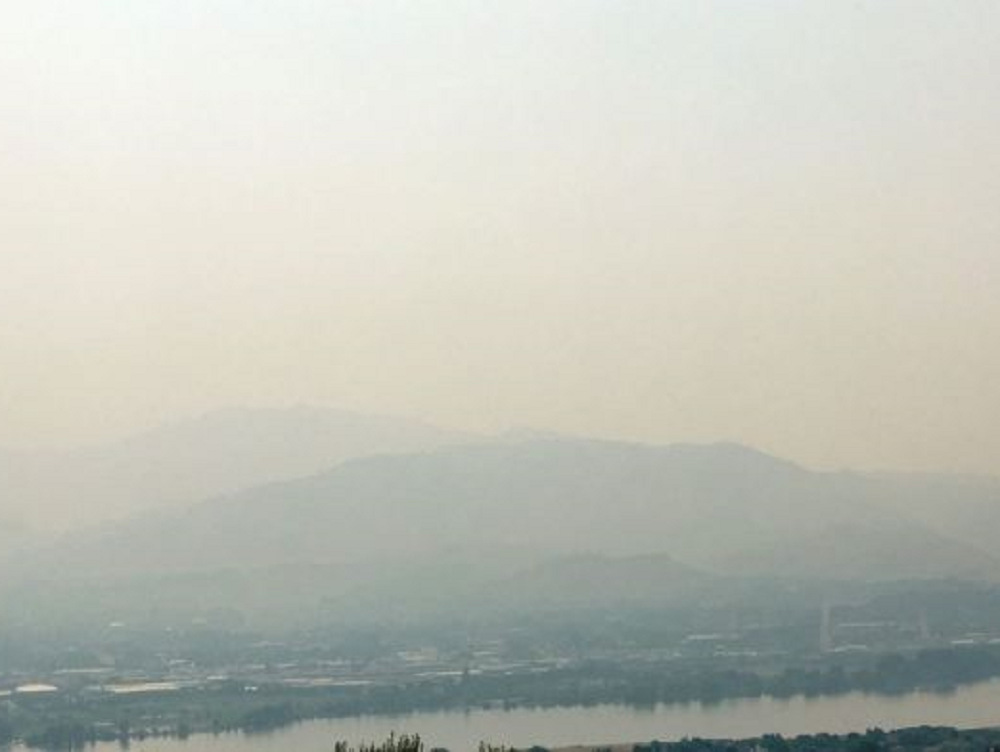 Clearing the smoke above the West Coast may take time – and it’s more than just a question of looks.
Clearing the smoke above the West Coast may take time – and it’s more than just a question of looks.
Early predictions that smoke from unprecedented wildfires blanketing California, Oregon and Washington would quickly dissipate have disappointed those who look out their windows each morning to see the same dreary skies and hazy landscape as the night before. The National Weather Service says it’s is unlikely to change before the end of the week.
Lauren Jenks, the Washington health department’s assistant secretary for environmental public health, was blunt in describing the air quality in her state: “The cleanest air … right now is unhealthy, and … [elsewhere, it is] unhealthy or hazardous.”
She said if you are suffering from headaches, burning eyes, sore throat, shortness of breath or wheezing, it’s probably the smoke. Those are all short-term reactions to having to breathe smoky air.
More concerning is the long-lasting damage that can be caused by having to breathe this kind of air for days at a time over a span of years. Interviewed during a period of heavy smoke exposure in California in 2018, Dr. Sam Joseph said, “Some of the chemicals include carbon monoxide [CO] … carbon dioxide [CO2] and particulate matter [soot].”
CO and CO2 can cause headaches and shortness of breath. Soot can have more lasting and serious health effects.
Jenks said that there had been little research on the long-term effects of wildfire smoke. She also expressed concern about the effect fire can have on mental well-being as a result of “a combination of things. It’s the trauma of being in a fire, and maybe losing their home. It’s emotional impacts and mental health impacts, and some very intense and long-term exposure to the smoke.”
The increased stress of other issues in 2020 is liable to make people’s reaction to wildfire even worse.
Jenks urged people to stay indoors as much as they could, to reduce their exposure to smoke. She admitted that this was not liable to be welcome advice in the midst of the 2020 pandemic.
“It’s a longer period of time where we need to be isolated,” she said. “That can be really hard for people…[W]e’ve got the pandemic, we’ve got the fires and the smoke impacts. This is really a lot [for] people to deal with.”
Many people turn to physical activity to relieve boredom and elevate their mood. Jenks says that unfortunately, that isn’t advisable – people should work out only indoors, and only very lightly. People who are working out tend to inhale more air, and to inhale through their mouths, which results in soot particles being drawn deep into the lungs. An N-95 mask is a good idea whenever going outside, but N-95s provide a lot more protection, but they are harder to breathe through, according to Jenks, who said it’s not a good idea to put an N-95 mask on for exercise.
“We recommend them for times when you can absolutely not avoid being outside,” Jenks said, while noting that an N-95 mask won’t make a proper seal on the small face of a child, or on a person with facial hair.
To improve air quality indoors, Jenks recommended keeping doors and windows closed, setting air conditioners to recirculate indoor air, and use an air purifier with a HEPA filter. Failing that, a HEPA filter can be fitted over an ordinary box fan. Jenks cautions against using a remedy which has been widely circulated on social media, of boiling herbs in a pan: “It really does just put more particles in the air, particularly some of the oils and the herbs that could cause additional irritation.”
If dry air is increasing the irritation of your throat, she said, drink more liquids.
“While you’re staying inside,” Jenks says, “those [HEPA] filters are your best bet for making sure you’re breathing clean air as much as possible inside your house.”
If you’re not sure how to fit a HEPA filter over a fan, any of these videos can help: https://youtu.be/9vJk5BM8xUo, https://youtu.be/kH5APw_SLUU, https://youtu.be/OVVGExTGCl8.
John M. Burt
Do you have a story for The Advocate? Email editor@corvallisadvocate.com


